Thank you dear friends, readers, participants and lovers of the quiz and the blog!
Thank you for the overwhelming response! It was also nice to see you, Lomo and Andi, who put their annual appearance at the birthday celebrations. Good to know, that you are there somewhere in the background. Maybe this is also a good opportunity to thank all the dear readers, who read the posts but can’t respond. THANK YOU everybody for all the support, love and affection you shower on me and the blog.

It was great fun for me to put the quiz together, but what was difficult, was to give points. In fact most of the participants gave all the answers right. There were only small technical mistakes, like forgetting to name a singer or the film name explicitly. So the points scored show rather my stringency, or shall we say tight-fistedness in giving points, rather than the participants’ knowledge of the songs.
Nobody got the answer to the 20 points question. What’s more, some also attempted to solve it. In fact, I would have been really surprised if anybody had got it right. Who would keep the statistics of this blog? 🙂
Maybe I should have framed the question properly. My mistake!

Sunehriyaadein had the best go at that question and her answer had me in splits for hours. With her kind permission I’m sharing it here.
Read the rest of this entry »
Tags: A big white mausoleum, aaja re aa zaraa aa lehra ke aa zara aa, above the second floor, AK, Anand Bakshi, Andi, Anniversary Quiz Answers, Anu, Aparna, Arunkumar Deshmukh, Asha Bhosle, Asha Parekh, Asha-Rafi, Ava, bachpan ke din bhi kya din the, Badi Behen [1949], Bina Rai, blames it on somebody, broken heart and don’t want to live anymore, chale jaanaa nahin, Chris, come hither a bit = aaja re aa zaraa aa, coy boy toy Roy, Cycle, dance till it dies, Dave, dekhiye sahibon woh koi aur thi, dev anand, Dharmendra, don’t go after meeting the eyes, Elder sister, Elvis and a wish, Flames, Footpath [1953], geeta bali, Geeta Dutt, Gold = Hema Malini, Hemant Kumar, Husnlal Bhagatram, Jaal [1952], jab dil hi toot gaya, jab tak hai jaan jaan-e-jahan, Joy Mukherjee, K. L. Saigal, kaisa jaadoo daalaa re, kaisa jadoo daalaa re, Khayyam, Kishore Kumar, Lalitha, Lata Mangeshkar, Laxmikant-Pyarelal, Lomo, Lotus-like, Love in Tokyo [1966], Madan Mohan, Majrooh Sultanpuri, Manna Dey, Meena Kumari, Miss Fish, Mohd. Rafi, Moon-Art, Mukesh, nain milaake, Nalini Jaywant, Naujawan [1951], Naushad, Pacifist, punished for love, Quiz Answers, R. D. Burman, Raja, Rajinder Krishan, Roshan, S. D. Burman, Sahir Ludhianvi, Saigal, Sardar Jafri, Shahjehan [1946], Shailendra, Shammi Kapoor, Shankar-Jaikishan, Shashikala, Sholay [1975], songsofyore.com, Sujata (1959), Sujata (means of a good caste), Sunehriyaadein, Taj Mahal [1963], Teesri Manzil [1966], thandi hawayein lehrake aaye, The childhood days spent like a butterfly, The cool breezes blowing, The Emperor of the world, the magician’s spell, the net, the night and moonlight will not come again, the pedestrian zone, The sacred book, The stringed instrument, where the sun rises, woh koi aur thi, ye raat ye chandani phir kahan, Youthful, zurm e ulfat pe hamen log sazaa dete hain
My ten favourite Meena Kumari songs
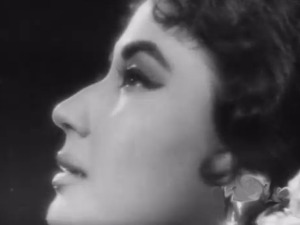
Meena Kumari, a face, which launched thousand tragic films. A thousand might be a bit of exaggeration, but she alone on her star-power helped tragic films to great success. In the 50s and even in the frolicking, colourful 60s, people would flock the cinema halls (to different degrees) to see her suffer. She was also an adept comedienne, in which she also excelled and was quite successful as seen in Magroor [1950], Miss Mary [1957], Azaad [1955] and Kohinoor [1960].
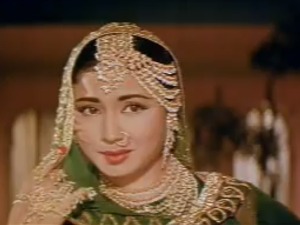
Meena Kumari at a certain time in my childhood played a big role in shaping the image of women in my psyche. Exposed to a slew of films, where she played a neglected wife, a suffering daughter-in-law, a sacrificing daughter, a caring sister-in-law, a protective sister or ‘simply’ a tormented woman between two men, she moulded an image of women being forever doomed to suffer at the hands of men in life. It is true that even other leading ladies like Mala Sinha (Anpadh) or Nutan (Khandan, Chhota Bhai) played such roles but it was as if they were impersonating Meena Kumari in these films. Meena Kumari remained always the original and the one to which others had to match to.
The presence of strong, independent and liberal women in my family and surroundings though would rectify the image in my mind; Meena Kumari would nevertheless always remain special.
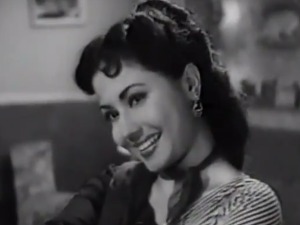
On 31st March it was her 41st death anniversary. To commemorate it here are ten of my favourite songs filmed on her. Read the rest of this entry »
Tags: 31st March, 41st death anniversary, aaj ham apni duaon ka asar dekhenge, aaj to meri hansi, ajeeb dastan hai yeh, Akeli Mat Jaiyo [1963], Asha Bhosle, Ashok Kumar, Bahu Begum [1967, Baiju Bawra [1952], C Ramchandra, chalo dildaar chalo, chalte chalte, Chitralekha [1964], Dil Apna Aur Preet Parai [1960], Dil Ek Mandir [1963], duniya kare sawaal to ham kya jawab de, Durga Khote, Edwina Violette, Geeta Dutt, Ghulam Mohammad, Gomti Ke Kinare [1972], ham tere pyar me saara aalam, Hasrat Jaipuri, Hemant Kumar, inhi logon ne, Kaajal [1965], Kamal Amrohi, kitni jawan hai raa tkoi yaad aa gaya - Azaad [1955], Lata Mangeshkar, Madan Mohan, Majrooh Sultanpuri, mausam hai aashiqana, Meena Kumari, mohe bhool gaye sanwariya, My ten favourite Meena Kumari songs, Nadira, Naushad, Pakeezah [1972], piya aiso jiya me samay gayo re, Raaj Kumar, Rajendra Krishna, Rajendra Kumar, Ravi, Roshan, Sahib Bibi Aur Ghulam [1962], Sahir, Sahir Ludhianvi, sansar se bhaage phirte ho, Sawan Kumar Tak, Shailendra, Shakeel Badayuni, Shanker-Jaikishan, thade rahiyon, tora man darpan kehlaye, woh jo milte the kabhi
Arunji, whose anecdotes and memories of the good old times we adore and whose filmi knowledge, we admire, springs in the arena once again to fill up the empty time space here. Thank you Arunji! Without much ado, I pass the mike to him.
Arunkumar Deshmukh’s ten favourite inspired song-pairs
EK DIL DO JAANE- EK TUNE DO GAANE
The other day I was reading a book in my Drawing Room,when I heard my college going grandson telling a small boy,” you don’t know,but in our times,things were not like this…”
I smiled. Every generation thinks that their times were better that the present one.
I wondered whether if I tell today’s children that in my college days,Petrol was costing only 5 Rupees a Gallon (around 3.7 Litres) or that a car driver could be hired on a salary of Rs.150 pm, will they believe it ? We never believed when our elders told us that Gold was bought by them at 10 Rs. a Tola (about 11.4 Gms.),because at the time of my marriage Gold was costing 150 rupees per Tola(about 11.4 gms).Today when Gold has crossed the barrier of rs.30000 for just 10 gms,these stories look like Arabian Night stories,indeed !!
Sometimes I keep thinking if old times were better or the present times are better.I have not been able to come to any conclusion so far.
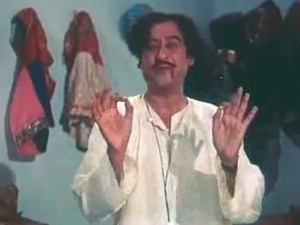 Read the rest of this entry »
Read the rest of this entry »
Tags: Aa jao tumhe dil ka, Aakhri Dao [1958], Aankhon se jo utari hai dil mein, Anand Bakshi, Anil Biswas, Anjum Pilibhiti, Anmol Ghadi [1946], Arun Deshmukh, Arun Deshmukh’s ten favourite inspired song-pairs, Arzoo [1965], Asha Bhosle, Aye phoolon ki raanee, B R Sharma, Chunariya [1948], De di hamen Azaadi, Dharamputra [1961], Didi [1948], Dil e naashaad ko jeene ki hasrat, Dil jalta hai to jalne de, Dr.Safdar 'Aah', Ek phool do Maali [1969], Guest Post, Hamee se muhabbat hamee se Ladai, Hansraj Behl, Hasrat Jaipuri, Heer [1956], Hemant Kumar, Jaadoo [1951], Jagriti [1954], Jeevan Mrityu [1970], Kavi Pradeep, Kiska deep Jalta hai, Kya mil gaya Bhagwan, Lata Mangeshkar, Laxmikant-Pyarelal, Leader (1964), Madan Mohan, Main jab bhi akeli hoti hoon, Majrooh Sultanpuri, Mamta [1966], Manna Dey, Mitti Me Sona [1960], Mohd. Rafi, Mukesh, Mukund Masurekar, N.Datta, Naadan muhabbat walon ke, Naujawan [1951], Naushad, Naya Daur [1957], Noorjehan. Dil leke daga denge, O. P. Nayyar, Pehli nazar [1945], Phir milogi kabhi, Phir Wohi Dil Laya Hoon [1963], Poocho na hamein, Prem Dhawan, Rahen na rahen hum, Raja Mehdi Ali Khan, Ravi, Roshan, S. D. Burman, S. H. Bihari, Sahir Ludhianvi, Saraswati Kumar Deepak, Shakeel Badayuni, Shanker Das Gupta, Shanker-Jaikishen, Thandi hawayen, Vo chaand muskuraya, Yeh parda hataa do, Yeh Raat Phir Na Aayegi [1966], Zamane mein aji kai aise naadan
My ten favourite insomnia songs
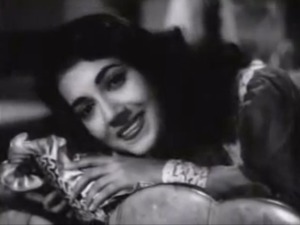 Spending the night in bed tossing around has happened to each and everybody of us. One would like to sleep, but the stream of thoughts just don’t end. The body is tired, but the mind wide awake. You tell yourself, that you have so many things to do the next day and the most appropriate thing to do now would be to sleep. You get irritated over it, which make matters only worse. And then in the wee hours of the morning, when you are supposed to be soon getting up, you fall asleep in sweet, sweet slumber! A dear friend of mine, Raja, was in this situation a few days back. This unfortunate incident made me come up with this list.
Spending the night in bed tossing around has happened to each and everybody of us. One would like to sleep, but the stream of thoughts just don’t end. The body is tired, but the mind wide awake. You tell yourself, that you have so many things to do the next day and the most appropriate thing to do now would be to sleep. You get irritated over it, which make matters only worse. And then in the wee hours of the morning, when you are supposed to be soon getting up, you fall asleep in sweet, sweet slumber! A dear friend of mine, Raja, was in this situation a few days back. This unfortunate incident made me come up with this list.
But the songs below don’t sing about the situation described above, but are rather moans of separated lovers or are freshly-fallen-in-love pairs. For this list, I have chosen songs with neend(iyaa) na aaye in the mukhdaa (refrain). I hope you like them as much as I do.
Read the rest of this entry »
Tags: Aji Bas Shukriya [1958], Amar Prem [1974], Amirbai Karnataki, Amrita Singh, Anand Bakshi, Anil Biswas, Anita Guha, bairan neend na aaye mohe, bairan nindiya kyun nahin aayi, beimaan tore nainawaa neendiya na aaye, Chachaa Zindabad [1959], D. N. Madhok, Dhun [1953], Dilip Kumar, Faroque Kaiser, geeta bali, Hansraj Bahl, Hemant Kumar, insomnia, jaane kyaa baat hai, Kaifi Irani, Kalyanji-Anandji, Lata Mangeshkar, Madan Mohan, Madhubala, Meena Kumari, Miss Mary [1957], Munimji [1955], my ten favourite insomnia songs, Nalini Jaywant, Nargis, neend na aaye, neendiya na aaye, o neend na mujhko aaye, Post Box 999 [1958], Pujaari [1946], R. D. Burman, raina beeti jaaye, Rajesh Khanna, Rajinder Krishan, Roshan, S. D. Burman, saajan bin neend na aave, saari saari raat teri yaad sataye, Sahir Ludhianvi, Shakila, Sharmila Tagore, so gaya saara zamana, Sunil Dutt, Sunny Deol, Sunny [1984], Tarana [1951], tum bin piya nindiya na aaye, Wali Sahab
My ten favourite kaun aayaa songs
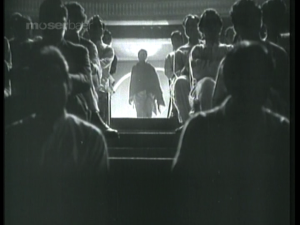
I’m sure it must have happened to you as well. Sometimes you meet a person and the mere presence of this man/woman makes you feel good. You need not talk about overtly intelligent topics. You might not laugh heartily, but just being in the presence of that particular person makes you feel wonderful. It makes you feel as if you have experienced inner growth. Few days back, I again had such an experience, where I was left wondering: What was that? I was so elated, that I posted the song yeh aaj meri zindagi me kaun aa gaya on a forum I frequent, which gave me the idea for this post.
Unlike my last experience, the encounters making the characters of Hindi film exclaim “yeh kaun aayaa” are mostly of romantic nature. Some feel that spring has come, while others feel the moon has risen. Everybody has his or her own of exclaiming and rejoicing in this emotion. I personally think that a good song can convey more than the words themselves. So, enjoy my ten favourite kaun aayaa songs and tell me about yours.
Read the rest of this entry »
Tags: Anand Bakshi, Anoop Kumar, Asha Bhosle, Asha Parekh, Baazi [1951], Deepti Naval, Dekh Kabira Roya [1957], dekho yeh kaun aayaa, Dil Deke Dekho [1959], Farooque Sheikh, Geeta Dutt, imi Garewal, Imtihaan [1974], Indu Jain, Jawani Diwani [1972], Jaya Bhaduri, Kalpana Karthik, Katha [1983], kaun aayaa kaun aayaa, kaun aayaa ki nigahon me chamak jaag uthi, kaun aayaa mere man ke dwaare, kaun yeh aayaa mehfil me, Kishore Kumar, Lata Mangeshkar, Laxmikant-Pyarelal, Look who’s here!, Madan Mohan, Majrooh Sultanpuri, Manna Dey, Mohd. Rafi & Usha Khanna, Munshi Aarzoo, my ten favourite kaun aayaa songs, Nartaki [1939], Naseeruddin Shah, Naushad, Pankaj Mullick, Poonam Dhillon, R. D. Burman, Raaj Kumar, Raj Kamal, Rajendra Krishan, Rajendra Kumar, Randhir Kapoor, Ravi, rosha maati, roz shaam aati magar aisi na thi, S. D. Burman, saamne ye kaun aayaa dil me huyi hulchal, Saathi [1968], Sadhana, Sahir Ludhianvi, Savere Wali Gaadi [1986], Shakeel Badayuni, Shammi Kapoor, Sunny Deol, Suresh Wadkar & Asha Bhosle, tambadi maati, Tanuja, Usha Khanna, Vinod Khanna, Waqt [1965], yeh kaun aaj aayaa sawere sawere, yeh kaun aayaa, yeh kaun aayaa ke mere dil ki duniya me bahaar aayi, yeh kaun aayaa roshan ho gayi mehfil kisake naam se
My ten favourite Nalini Jaywant solo songs
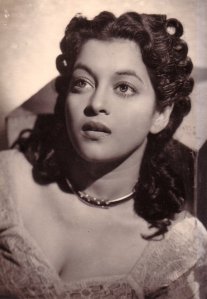
If I ask my niece who is Nalini Jaywant, she will most probably say that she must be one of my innumerable aunts. In fact, I do have a distant aunt with the name of Nalini. But the actress Nalini Jaywant seems to have faded into oblivion. When one reads discussions on Hindi film actresses of the 50s, her name hardly appears. Maybe the reason is her self-imposed exile, otherwise it is hard to understand, why she should disappear from public memory. In her heydays she was considered the most beautiful actress and as a talented actress by her colleagues.
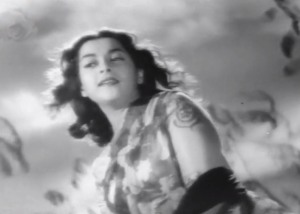
She started her career in her teenage years, playing sister (the title role) to Sheikh Mukhtar in Mehboob Khan’s Bahen [1941], where she sang all her songs in her own voice.. Her films in the 40s were nothing to write home about, till she made a splash with Anokha Pyar [1948] as the all-sacrificing part of the triangle, showing Dilip Kumar once again between two strong ladies, the other being Nargis. After that there was no looking back for her, acting in hit films like Samadhi, Naubahar, Rahi [1952], Shikast, Munimji, Nastik and Kala Pani. Like many of her contemporaries she couldn’t carry her success streak into the 60s and retired from the silver screen. She appeared only in two films in the 80s Bandish [1980] and Nastik [1983].
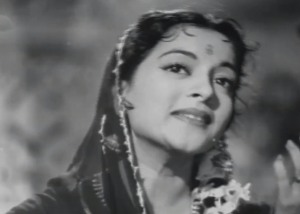
More detailed writing on her career can be found at Upperstall and by Shishir Krishna Sharma on his blog. The first and last photo in this post are from his collection. Thank you Shishirji for the loan!
Here are my ten favourite solo songs of this beautiful and talented actress. Enjoy!
Read the rest of this entry »
Tags: abhi shaam aayegi niklenge taare, ae ri main to prem deewani, Ajit, Asha Bhosle, Ashok Kumar, beimaan balama man bhi jaa, C Ramchandra, chand madham hai aasman chhup hai, dev anand, dil laga ke kadar gayi pyaare, Dilip Kumar, ghayal hiraniya main ban ban, Hum Sab Chor Hain (1956), jab nain mile nainon se, Jadoo [1951], Kala Paani [1958], kanha bajaye bansuri aur gwale bajaye manjire, kare badra tu na jaa, Lata Mangeshkar, Madan Mohan, Majrooh Sultanpuri, Meerabai, Munimji [1955], My ten favourite Nalini Jaywant solo songs, Nalini Jaywant’s second death anniversary, Nastik [1954], Nau Bahar [1952], Naujawan [1951], Naushad, O. P. Nayyar, Pradeep, Premnath, Railway Platform [1955], Rajinder Krishna, Roshan, S. D. Burman, Samadhi [1950], Shailendra, Shakeel, Shammi Kapoor, Shamshad Begum, Shankar-Jaikishan, Shikast [1953], Shishir Krishna Sharma, Sunil Dutt, Suresh, thandi hawayein lehra ka aaye
My ten favourite Sadhana songs

Today on your 71st birthday, wish you a happy birthday and many more to come, dear Sadhana! Thanks for the beautiful films and moments, which you have gifted us!
Sadhana, one of the Hindi screen’s beautiful leading ladies. She was a trend-setter in fashion, when nobody even knew this word. She was glamorous, beautiful and more importantly talented actress. Given the trend of the 60s, where the frothy musicals reigned supreme, she got ample scope to show her acting talents in variety of films. Bimal Roy, the ace-director cast her in Parakh (1960) and Prem Patra (1964). Raj Khosla made a trilogy of films with her in central roles Woh Kaun Thi? (1964), Mera Saaya (1966) and Anita (1967).

Her thyroid problem led to an eye ailment, which led to her going on a long treatment in the USA, due to which she was missed on many films. Her come-back films were Intequam (1969) and Ek Phool Do Mali (1969) were hits. The 70s even saw her don the cap of the director for Geeta Mera Naam (1974). The changing trends of the 70s saw her take retirement from the silver screen, though the 70s saw the release of delayed films like Amanat (1975), Vandana (1975) and Mehfil (1981). Her last film Ulfat ki Nayi Manzilein, whose music was released in 1968, got released in 1994. In the song here, we see how the film must have been completed with doubles, in the song, baharon se kahenge nazaroon se kahenge, we see only the back of the character played by her.

I have chosen only solo songs from her films and I have restricted myself to one song pro film.
Enjoy!
Read the rest of this entry »
Tags: aap ki inayaten aap ke karam, Ajay Sahni, Anand Bakshi, Anita [1967], Asad Bhopali, Asha Bhosle, Asli Naqli [1962], Bimal Roy, Biswajeet, dev anand, Dharmendra, Ek Phool Do Mali, Feroz Khan, Geeta Mera Naam [1974], guru dutt, hamne jin ke khwab sajaye, Happy Birthday Sadhana!, Hrishikesh Mukherjee, hum khoob jante hai, Ishq Par Zor Nahin [1970], kareeb aa yeh nazar phir mile, kaun aaya ki nigaahon me chamak jaag uthi, Kishore Kumar naina barse rimjhim rimjhim, kitna rangeen hai ye chaand sitaaron ka samaa, Lata Mangeshkar, Laxmikant-Pyarelal, Madan Mohan, main to tum sang nain milake haar gayi sajana, Manmauji [1962], Manoj Kumar, Mera Saaya [1966], My ten favourite Sadhana songs, Naaz, naino me badra chahe, o mere bairaagi bhanwara, o sajana barkha bahaar aayi, Parakh [1960], Parikshit Sahni, Picnic, Raaj Kumar, Raja Mehdi Ali Khan, Rajinder Krishan, Ravi, S. D. Burman, Saajan Ki Galiyan, Sahir, Salil Chowdhury, Shailendra, Shankar-Jaikishan, Sunil Dutt, suniye zara dekhiye na, tera mera pyar amar, Vandana [1975], Waqt [1965], Woh Kaun Thi [1964], Zaheeda
My ten favourite songs on clouds and separation
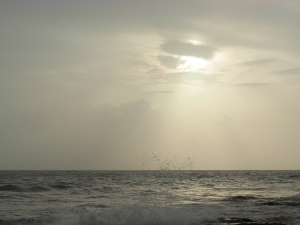
Mid-June, the rains used to arrive in Bombay when I was a kid. The black clouds would hold the promise of change. This would mean relief from the heat and dust of the preceding summer months and a burst of new life. The dreary plain near our house would promise to turn into a pond with lots of small streams arising and emptying in it. These small streams would then become alive with small and big crabs and tadpoles! Coinciding with the arrival of the black clouds, the new school year would also arrive. This would mean new textbooks! The dark messenger would also bring the hope, that I would share the class room with my friends from last year, but at the same time also the anxiety if I would again have to spend this new school year with class bully.
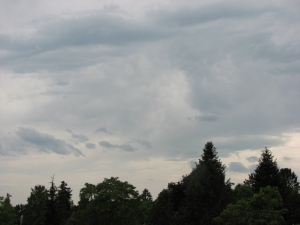
These dark water-bearers of sky, who brought so many emotions in my being were and are also the bearers of hope over the centuries in India for separated lovers. The earliest mention is found in Meghduta (the cloud messenger) by Kalidasa (most probably 4th century CE). It tells the story, how a yakṣha (a supernatural being), after being exiled, asks a passing cloud to take a message to his wife. In Hindi cinema though, we find mostly women singing to the clouds. They call upon them to be their messengers, to take a message to their far-off beloveds, asking them to return back.
Read the rest of this entry »
Tags: Ameeta, Anil Biswas, Asha Bhosle, Azaad [1955], Bahana [1960], Bharat Vyas, C Ramchandra, Chashm-e-Baddoor [1981], Chhote Nawab [1961], clouds, D. N. Madhok, Dar Laage Garaje Badariyaa, Deepti Naval, Dharti Kahe Pukar Ke [1969], Dilip Kumar, Gaban [1966], Ghar Aaja Ghir Aaye Badaraa Sanvariyaa, Gulzar, Haimanti Shukla, Indu Jain, Ja Re Kare Badra, Jaa Re Badara Bairi Jaa Re, Jaa Ri Jaa Ri O Kaari Badariya, Jab Kaari Badariyaa Chhaayegi, Jeetendra, Kahan Se Aaye Badaraa, Kalidasa, Karan Deewan, Lajawab [1950], Lata Mangeshkar, Laxmikant-Pyarelal, Madan Mohan, Majrooh Sultanpuri, Meena Kapoor, Meena Kumari, Meghduta, Mehmood, Mohammed Rafi, monsoon, My ten favourite songs on clouds and separation, Namkeen [1982], Nanda, Naushad, Of Clouds and Separation, Phir Se Aiyo Badaraa Bidesi, Prem Dhawan, R. D. Burman, rain, Rajinder Krishan, Rajkamal, Ram Rajya [1967], Rattan [1944], Sadhana, Sawan Ke Badalon Unse Yeh Jaa Kaho, Shabana Azmi, Shailendra, Shankar-Jaikishan, Sheila Vaz, Sunil Dutt, Swarnlata, the cloud messenger, Tum Bin Sajan Barase Nayan, Vasant Desai, yakṣha, Yesudas, Zohra Bai
First of all I would like to thank everybody for their good wishes to my/our blog on its birthday.
The quiz got a nice response. Shashi and Samir sent me the answers the very next day. They had some sophisticated techniques to get to the answers. Samir in his feedback to the quiz elaborated on it. Samir, would you be so kind to post it also in the comments section below? It is very enlightening!
Lalitha was very industrious and worked till the last hour and sent me her answer four hours back.
Totally eight persons sent me their answers and it was fun going through them. Lomo and Andi were new for me. They told me that they usually read my posts and the comments by the readers and that they enjoy it a lot and at times more the comments than the post itself (so says Andi).
Here are the scores
Archana = 128,5
Pacifist = 126
Shashi = 124
Samir = 106
Lomo = 100
Lalitha = 93
Andi = 93
Anu = 55
Congratulations Archana for scoring the most points and thanks to all participants! The email communication with you regarding the hints and clues was a source of great pleasure for me!
Well, here are the answers! Read the rest of this entry »
Tags: 5 Rifles, Aaj Yeh Meri Zindagi, Aar-Paar, Abhi To Haath Me Jaam Hai, Ambika Johar, Amitabh Bachchan, Anand Bakshi, Anjaan, Asha Bhosle, Aziz Nazan, Bappi Lahiri, Chandan Ka Palna [1967], Chhod Mera Haath Mujhe Peene De, dev anand, Dharamendra, Dil Hi To Hai [1963], former Miss India, Geeta Dutt, happy God, Hasrat Jaipuri, Hoon Abhi Main Jawan Ae Dil, Hum Hain Nashe Mein, Jhoom Bharabar Jhoom Sharabi, Kishore Kumar, Lata Mangeshkar, Laxmikant-Pyarelal, Leela Naidu, Madan Mohan, Mahjabeen, maid of jerky movements, Majrooh Sultanpuri, Manna Dey, Meena Kumari, Mohd. Rafi, Mujhe Le Chalo, Mukesh, Namak Halal, Naza Sholapuri, Nutan, O. P. Nayyar, R. D. Burman, Raj Kapoor, Rajinder Krishan, Rakesh Khanna, Ramlal, Ravi, Roshan, Sahir Ludhianvi, Sandhya, Seeta aur Geeta [1972], Sehra [1963], Shahi Kapoor, Shakila, Sharaabi, sharabi sharabi mera naam ho gaya, Subah-O-Sham [1972], the illustrious one, Thodi Si Jo Pee Li Hai, Tumhari Mast Nazar, Waheeda Rehman, Yeh Raaste Hai Pyar Ke
My ten favourite blind women songs
I got the idea for this post when I read Yves’ review of the Sparsh [1980]. Blind people abound in Hindi cinema mostly as some blind chachas (uncles) in slums or are poor sisters or mothers, for whose eye-operation the hero commits some crime. Then there are the female leads, who are blind, where the story follows one way or the other the plot of Charlie Chaplin’s City Lights. Of course there are stories, where the story follows a different path altogether. All the stories have one thing in common that mostly the curing of the blindness plays a central role in the story. Exceptions as usual confirm the rule.

In my post Mala Sinha song list, while commenting the song from Patanga. I wrote that the species of blind heroines became rare in the 80s. I didn’t know that they had become so abundant in the last decade. My favourites though, as you would guess, are not from the last decade but earlier. Well, here they are! Enjoy!
Read the rest of this entry »
Tags: Aaj Raat Ko, Abke Na Sawan Barse, Ae Kaash Mein, Amitabh Bachchan, Anand Bakshi, Anuraag [1972], Aparna Sen, Asha Bhonsle, Asha Parekh, Barsaat Ki Ek Raat [1981], blind flower girl, Blind women, Chirag [1969], Chitchor, Chitragupta, Do Ghoont Mujhe Bhi Pilaade Sharabi, Faisla [1988], geeta bali, Gulzar, Hai Woh Pardesi Man Me, Hema Malini, Hemlata, Imaan Dharam [1977], Jailor [1958], Jeetendra, Jheel Ke Us Paar [1973], kandibona phagun gele, Kinara [1977], Koi To Aiye Re Bada Intezar Hai, Lalita Pawar, Lata Mangeshkar, Laxmikant-Pyarelal, Log Kahe Mera Saanwalaa Sa Rang Hai, Madan Mohan, Majrooh Sultanpuri, Mala Sinha Rajendra Kumar, Moushumi Chaterjee, Mujhi Me Chhupkar Mujhi Se Door, Mumtaz, Nasseruddin Shah, Patang (1960), R. D. Burman, Raakhee, Rajendra Krishan, Rameshwari, Rang Dil Ki Dhadkan Bhi, Ravindra Jai, Saira Banu, Satyajeet, Shashi Kapoor, Sohrab Modi, Sujit Kumar, Sun Ri Pawan, Sunayana [1979], Sunil Dutt, Vijendra Ghatge, Vinod Mehra
















